Fumie Sato poses for picture in her backyard Saturday, Aug. 1, 2020, at her home in Yokohama, Japan. Hours after she heard Emperor Hirohito's Aug. 15 radio speech declaring Japan's defeat at her school ground in Manchuria, China, Sato had to be prepared for honorable suicide with her family, though her father decided his family must live. Two years later she almost became an orphan when her little sister died of illness after their mother and little brother took an earlier boat back to Japan. (AP Photo/Kiichiro Sato)
The Associated Press
TOKYO (AP) - The last day of the Pacific War was also supposed to be Fumie Sato's last.
After hearing Emperor Hirohito's Aug. 15, 1945, radio broadcast declaring Japan would soon be "enduring the unendurable'ť in defeat, her father, an Imperial Army officer in Manchuria, announced his family would die by suicide together because the Soviets would soon invade their neighborhood.
She was 13.
Now 88, as the 75th anniversary of the Pacific War's end approaches, Sato told her story publicly for the first time to The Associated Press. Not even her children had heard it until she recently showed them a letter detailing her ordeal in Manchuria. Sato is the mother of AP journalist Kiichiro Sato.
Somehow, when she learned that she was to die, she remained calm, even as she watched her father help bury the neighboring family in their yard after they killed themselves.
'œThere was nothing I could do. I just had to brace myself for it,'ť Sato said.
But later, when her father returned from an army meeting, he carried an order that his family must return to Japan alive.
For two years they waited for evacuation, living in constant fear of being attacked by the Russians now in Manchuria. Captured at one point by the Soviets, her father was about to be sent to Siberia when Chinese friends rescued him.
Her family lived on meager earnings from selling fermented beans that they grew in a shelter and selling tobacco made from leaves they bought from Chinese growers. Fearing attack by Russians, older girls shaved their heads so that they looked more like boys.
Sato's father got sick and died and never made it home.
In 1948, they were finally allowed to evacuate. Her mother and other siblings went ahead. Sato stayed with a younger sister, Tomiko, who was ill, and they were to take a later train meant for the sick and their caregivers.
But before they could leave, her sister died. Sato was told she couldn't get on the train alone, but she was saved because there happened to be a solo patient who agreed to travel with Sato.
"If that person wasn't there, I would have been an orphan and never would have returned to Japan," Sato said. "Fate was on my side. I was lucky.'ť
She hugged a box containing the ashes of her sister to her chest as she traveled to Nagasaki, where she was reunited with the rest of her family at her uncle's home.
Sato declined her uncle's offer to pay for her high school, and instead got a job to help him.
Sato came forward with her story because at 88, she wants her children to know the suffering she went through after the war.
'œI'm already old, I could die any day. I thought it would be sad if my children didn't know anything about their mother's childhood memories," she said.
Former classmates from her school days in Manchuria invited her to join a trip there, but she declined.
'œI only want to remember happy memories,'ť Sato said.
___
Associated Press journalist Kiichiro Sato contributed to this report.
Fumie Sato talks about her ordeals as a wartime child Saturday, Aug. 1, 2020, at her home in Yokohama, Japan. Hours after she heard Emperor Hirohito's Aug. 15 radio speech declaring Japan's defeat at her school ground in Manchuria, China, Sato had to be prepared for honorable suicide with her family, though her father decided his family must live. Two years later she almost became an orphan when her little sister died of illness after their mother and little brother took an earlier boat back to Japan. (AP Photo/Kiichiro Sato)
The Associated Press
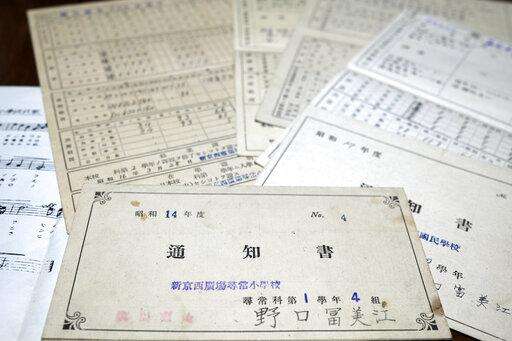
Report cards of Fumie Sato's first to sixth grades from the elementary school in Manchuria, China, are seen Friday, Aug. 7, 2020, at her home in Yokohama, Japan. Hours after Sato heard Emperor Hirohito's Aug. 15 radio speech declaring Japan's defeat at her school ground in Manchuria, China, she had to be prepared for honorable suicide with her family, though her father decided his family must live. Two years later she almost became an orphan when her little sister died of illness after their mother and little brother took an earlier boat back to Japan. (AP Photo/Kiichiro Sato)
The Associated Press
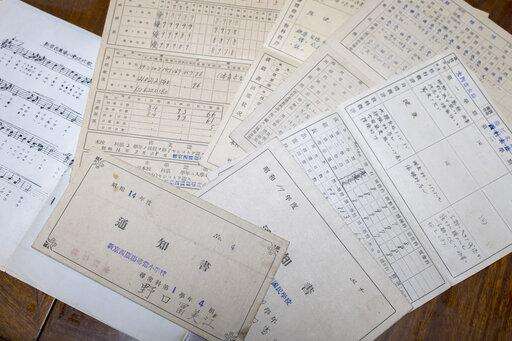
Report cards of Fumie Sato's first to sixth grades from the elementary school in Manchuria, China, are seen Friday, Aug. 7, 2020, at her home in Yokohama, Japan. Hours after Sato heard Emperor Hirohito's Aug. 15 radio speech declaring Japan's defeat at her school ground in Manchuria, China, she had to be prepared for honorable suicide with her family, though her father decided his family must live. Two years later she almost became an orphan when her little sister died of illness after their mother and little brother took an earlier boat back to Japan. (AP Photo/Kiichiro Sato)
The Associated Press
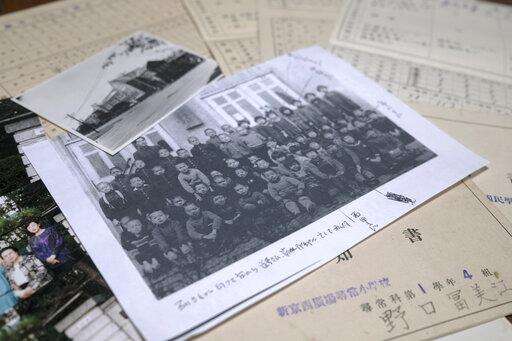
A photograph of a school building and a photocopy of a class picture on top of the report cards of Fumie Sato's first to sixth grades from the elementary school in Manchuria, China, are seen Friday, Aug. 7, 2020, at her home in Yokohama, Japan. Hours after Sato heard Emperor Hirohito's Aug. 15 radio speech declaring Japan's defeat at her school ground in Manchuria, China, she had to be prepared for honorable suicide with her family, though her father decided his family must live. Two years later she almost became an orphan when her little sister died of illness after their mother and little brother took an earlier boat back to Japan. (AP Photo/Kiichiro Sato)
The Associated Press
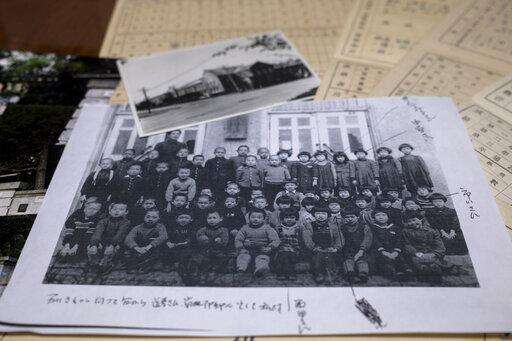
A photograph of a school building and a photocopy of a class picture on top of the report cards of Fumie Sato's first to sixth grades from the elementary school in Manchuria, China, are seen Friday, Aug. 7, 2020, at her home in Yokohama, Japan. Hours after Sato heard Emperor Hirohito's Aug. 15 radio speech declaring Japan's defeat at her school ground in Manchuria, China, she had to be prepared for honorable suicide with her family, though her father decided his family must live. Two years later she almost became an orphan when her little sister died of illness after their mother and little brother took an earlier boat back to Japan. (AP Photo/Kiichiro Sato)
The Associated Press
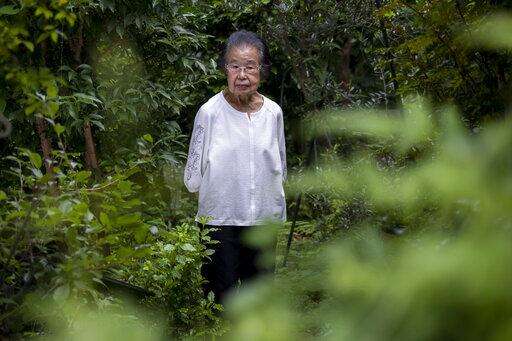
Fumie Sato poses for picture in her backyard Saturday, Aug. 1, 2020, at her home in Yokohama, Japan. Hours after she heard Emperor Hirohito's Aug. 15 radio speech declaring Japan's defeat at her school ground in Manchuria, China, Sato had to be prepared for honorable suicide with her family, though her father decided his family must live. Two years later she almost became an orphan when her little sister died of illness after their mother and little brother took an earlier boat back to Japan. (AP Photo/Kiichiro Sato)
The Associated Press
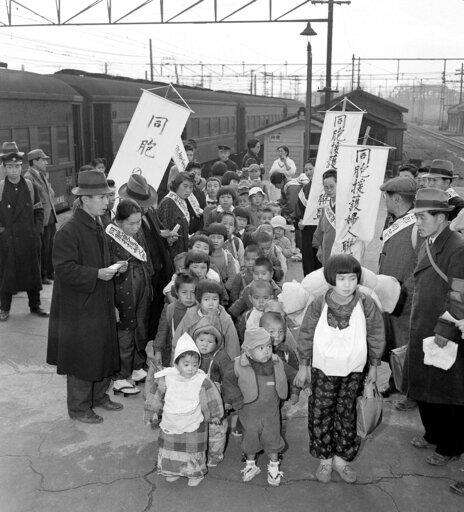
FILE - In this Dec. 6, 1946, file photo, Sober-faced young Japanese war orphans from Manchuria arrive in Tokyo, Japan, and walk double-file across a railroad station platform. A 10-year-old girl, Ishiko Hosoda, (right foreground) carries the ashes of her brother and mother, all of whom died in Manchuria. Her father is a prisoner of war of the Red Army in Siberia. At the end of the World War II, about 400,000 Japanese, including families of Imperial Army soldiers, Manchurian railway employees and farmers who had emigrated were in northern China, where Japan established a wartime puppet state. (AP Photo, File)
The Associated Press
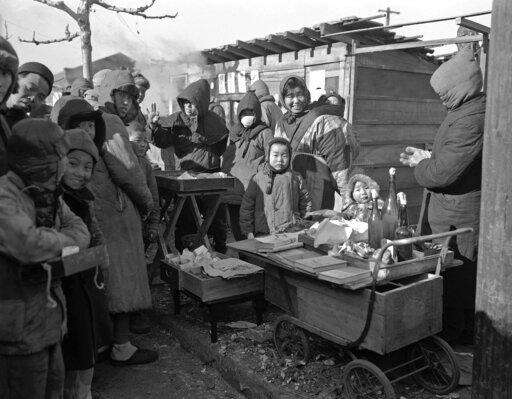
FILE - In this Feb 8, 1946, file photo, Japanese women are reduced to exchanging their personal belongings for goods from the street stand in Manchuria, China. They are waiting to return to Japan. At the end of the World War II, about 400,000 Japanese, including families of Imperial Army soldiers, Manchurian railway employees and farmers who had emigrated were in northern China, where Japan established a wartime puppet state.(AP Photo/File)
The Associated Press
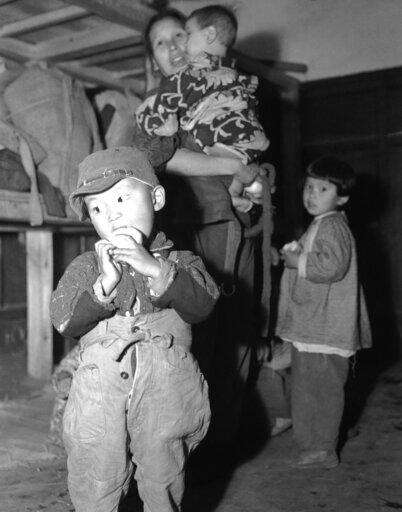
FILE - In this Oct. 12, 1946, file photo, a Japanese youngster, hungry after a long train trip from Russian-controlled Manchuria, munches an apple provided by the Japanese Red Cross on his arrival in Tokyo, in the first group of Japanese to be repatriated by the Russians. At the end of the World War II, about 400,000 Japanese, including families of Imperial Army soldiers, Manchurian railway employees and farmers who had emigrated were in northern China, where Japan established a wartime puppet state. (AP Photo/Charles Gorry, File)
The Associated Press